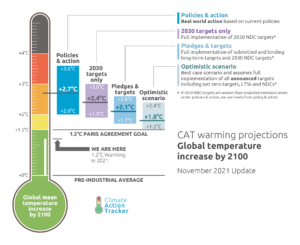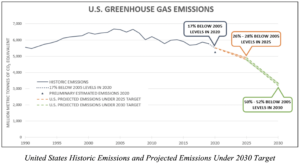As organizer of Climate Week NYC, the Climate Group focuses on collective action by animating networks of influential companies and governments.
Climate Week NYC opened with the presentation of a global to-do list of 7 actions to get the world back on track to meet the goals of the Paris Agreement.
NYC Climate Week 2024: breaking with the past
Climate Week NYC 2024 took place from September 22 to 29.
Who is the Climate Group, organizer of this major climate event?
The Climate Group is a non-profit organization dedicated to accelerating climate action. To achieve a low-carbon world by 2050, the organization focuses on collective action through networks of influential companies and governments. Since its launch in 2004, the Climate Group has brought together more than 500 multinationals operating in 175 markets within its network.
Its work focuses on the sectors that emit the most greenhouse gases, as well as those in which its network has the greatest impact. These include energy, transport, construction and industry.
The Group also works with governments around the world to promote the adoption of the most effective climate action policies. As part of this effort, the Climate Group provides the secretariat for the Under2 coalition, the largest network of states and regions committed to achieving net zero emissions by 2050.
The group’s third lever of action is the organization of Climate Week NYC, the world’s largest climate event, launched in 2009. The aim of the event is to bring together representatives from business, government and civil society to promote immediate climate action.
This year, Climate Week NYC opened with the presentation of a global to-do list of 7 actions to get the world back on track to meet the goals of the Paris Agreement. This action plan aims to bridge the significant gap between scientific recommendations and the reality of climate action deployed by governments and businesses. The Climate Group is therefore calling on decision-makers to focus on far more ambitious annual climate action lists than they have today.
Climate Week NYC has unveiled the seven actions on its global to-do list within the key sectors of climate action.
A call for a mindset shift from the world’s leaders
Climate Week NYC has unveiled the seven actions on its global to-do list within the key sectors of climate action. These actions are as follows:
- Supporting workers to reduce coal use – The Climate Group calls for increased compensation, for example by maintaining employees’ wages for 3 years in the event of early site closure.
- Deploying renewable energies – The Climate Group notes that many regulatory and permitting issues as well as unambitious targets set by G20 countries are holding back the deployment of renewable energies. This action point therefore calls on governments to remove these barriers by 2024, in order to achieve the G20 and COP28 commitment to triple global capacity by 2030.
- Ban the relining of coal-fired steel furnaces – The Climate Group points to the large number of furnaces that have to be relined, which means using coal for at least another 15 years. Conversely, the use of electric furnaces and the production of green hydrogen should now become the norm.
- Taking methane seriously – The Climate Group stresses the importance of a rapid and sustainable reduction in methane emissions to curb global warming. This action point calls on governments to create a powerful global agency by the next COP. This agency will have the authority to audit the statements and results of companies in the fossil fuel sector. The aim is also to identify the resources needed to tackle the biggest leaks.
- Stop ignoring energy efficiency – As this aspect of climate action is still neglected, the Climate Group is calling on every company to set a target of improving its energy efficiency by 5% over the next 12 months. The reduction will be achieved by optimizing insulation, heating, air conditioning and industrial energy, as well as by using electric vehicles. In addition, the group encourages the G20 to agree on a minimum investment incentive, following the example of the USA.
- Buying clean – The Climate Group believes that the considerable purchasing power of corporations and governments ($100 billion / year) can drive market change. As a result, these players should make climate a central purchasing criterion. They are all invited to favor healthy, low-carbon food, set targets for low-carbon steel and concrete, achieve a 100% renewable energy mix and invest in electric vehicles.
- Tax oil and gas companies to finance the transition – To ensure that the polluter pays, the Climate Group believes that the G20 should agree a new minimum import tax on oil and gas. A few dollars per barrel would raise hundreds of billions to finance the transition to a low-carbon world. Furthermore, the group points out that these companies declare billions of dollars in profits every year that are not invested in climate action.
Dedicated to building a new international consensus, the aim of the Summit of the Future is to identify concrete measures for advancing the SDGs.
This objective has been achieved with the adoption of a comprehensive, action-focused Pact for the Future.
Without a representative vote, no coordinated action and no results
Climate Week NYC took place at the same time as the Summit of the Future, organized by the United Nations in New York.
An attempt to put fossil fuels back at the centre of the debate ahead of the COP
Taking advantage of the summit taking place next-door, the Climate Group has brought together 15 mayors, governors and leaders from 5 continents to write a letter to heads of state on the subject of fossil fuels. The letter makes a direct appeal to tackle the sector without delay, stressing that “we must relegate fossil fuels to the past and limit their undue influence in the present.” Nehmat Kaur, director of the Under2 coalition, clarifies the reasons for this warning: “Those negotiating the final text of the UN’s Compact for the Future will rightly focus on the global crisis of security and peace, but they must not forget the climate emergency. If it is not tackled urgently, the consequences of its escalation will exacerbate conflicts and political tensions around the world.”
Dedicated to building a new international consensus, the aim of the Future Summit is to identify concrete measures for advancing the Sustainable Development Goals. Indeed, the year 2023 marked the halfway point in the global journey towards the implementation of the United Nations’ Agenda 2030, whose progress in Europe and internationally Positivéco has analyzed. So, now is the time for the United Nations to step up its efforts to meet existing commitments and act to address emerging challenges.
This goal has been achieved with the adoption of a comprehensive, action-focused pact.
The United Nations is looking to breathe new life into its sustainable agenda
What does this Pact for the Future, adopted on September 22, 2024, contain?
The negotiations resulted in commitments in the following areas:
Peace and security:
- Security Council reform plan
- Multilateral recommitment to nuclear disarmament
- Commitment to strengthening international governance of space to prevent its militarization
- Actions to prevent the militarization and misuse of new technologies, such as autonomous lethal weapons
Sustainable development, climate and development financing:
- Reforming the international financial system to better represent developing countries
- Improved measurement of human progress, going beyond GDP to include human well-being and sustainable development
- Commitment to study a minimum level of global taxation of large fortunes
- Confirmation of the need to keep temperature rises below 1.5°C and to move away from fossil fuels to achieve net zero emissions by 2050.
Digital cooperation:
- Publication of the Global Digital Compact, the first global standard for digital cooperation and the governance of artificial intelligence
- This document represents a commitment to the design, use and governance of technology for the benefit of all.
- It also represents the first global commitment to data governance, which is now on the UN agenda and requires parties to take concrete action by 2030.
Youth and future generations:
- Publication of the first Declaration on Future Generations, which includes the possibility of appointing a representative dedicated to these generations.
- A global commitment to provide more opportunities for young people to participate in decision-making that affects them.
Human rights and gender:
- Strengthening work on human rights, gender equality and women’s empowerment
- Call for the protection of human rights defenders
- A reminder of the importance of engaging other stakeholders in global governance, including local governments, civil society and the private sector.
Conclusion
Following the concrete recommendations of Climate Week and the ambitious commitments of the Summit for the Future, what’s next? All eyes are now on the agenda for the next G20 summit, to be held in Rio de Janeiro on November 18-19, 2024.
The Pact for the Future can be viewed in full on the UN website in English and French.
In 2023, the New York forum is giving a voice to emerging economies. These economies are already benefiting from a geographical redistribution of global economic growth.
The United Arab Emirates, was a key witness to these new opportunities. Razan Al Mubarak has been head of the Abu Dhabi Environmental Agency since 2010 and is the embodiment of this new generation.
Climate week NYC 2023 – The focus turns to growing economies.
In 2022, Climate Week in New York was an opportunity for Positivéco to put the US green economic policy and the attractiveness of its market back at the centre of our attention.
In 2023, we noted that the New York forum was giving a voice to emerging economies. These economies are already benefiting from a geographical redistribution of global economic growth. They weigh on the diplomatic stage and are positioning themselves as leaders in sustainability. Perhaps the leaders of the developed economies are ready to give up this position, as they struggle to implement decarbonisation objectives in their own territories?
The United Arab Emirates, which hosted COP 28, was a key witness to these new opportunities through the presence of Razan Al Mubarak. Razan Al Mubarak had been head of the Abu Dhabi Environmental Agency since 2010 and is the embodiment of this new generation. She is currently President of the International Union for Conservation of Nature (IUCN). She was appointed the United Nations Climate Change High-Level Champion for the leadership team of COP28.
In November, COP28 in the United Arab Emirates saw the first-ever comprehensive assessment of progress towards climate goals. An opportunity to take stock and look to the future.
Joe Biden had made it a presidential objective, and henceforth a bulwark against inflation: the country must have reduced its net greenhouse gas emissions by 50% by 2030 compared to 2005 emissions.
Under the scrutiny of the Carbon Action Tracker initiative, whose work was presented last year in NYC, the US roadmap is less promising.
The policies and measures taken by the country do not live up to the target and undermine its credibility.
Climate week NYC 2022 – The biggest Climate event on earth
In 2022, the city of New York organised its climate convention in a business context marked by the IRA Act and the colossal budget dedicated to greening the American economy by 2030 which created a huge call for projects. Major brands, start-ups, NGOs and strategists were all present.
Joe Biden had made it a presidential objective, and henceforth a bulwark against inflation: the country must have reduced its net greenhouse gas emissions by 50% by 2030 compared to 2005 levels, a target registered with the United Nations when the country joined the Paris Climate Agreement in 2021. According to US projections, the emissions curve would have turned permanently downwards.
According to US projections, the emissions curve would have bent permanently. Annual emissions would fall.
Under the scrutiny of the Carbon Action Tracker initiative, whose work was presented this week in NYC, the US roadmap is less promising. There would have been a pause in emissions in 2020 due to Covid, but emissions would have increased in 2021 by 6% compared to 2020. The policies and measures taken by the country do not live up to the target and undermine its credibility.
The global thermometer continues to rise.
Only 8-9% of global emissions would be covered by a satisfactory mitigation target. For an almost complete review of national and regional commitments, go to the NGO’s website.

Source: CAT warming projections, Global temperature increase by 2100, November 2021 Update
*NDC : Nationally Determined Contribution – https://unfccc.int/ndc-information/nationally-determined-contributions-ndcs
You would like to learn how to integrate this data into your business intelligence?
We are now offering 30-minute, 1-to-1 conversations to clarify what all these changes mean for your business.
About Positivéco
At Positivéco, we see the new national and international regulations on CSR as an opportunity for positive growth.
Our aim: to apply financial and commercial skills to structure projects outside the traditional silos.
Since 2009, we have been supporting climate investment and development aid projects; we evaluate CSR policies and carry out extra-financial reporting for our clients. Positivéco advises financial institutions, public actors, listed and non-listed companies.
Request a callback today and discover how you can meet the new CSR requirements while serving the company’s project.

Who we are
With Positivéco, your success is our priority. Since our conception, we have always applied financial and commercial expertise outside the traditional silos, to structure successful and impactful client projects. This improves the visibility of your activities for enhanced profitability and increases your financial valuation.









Contact us now!